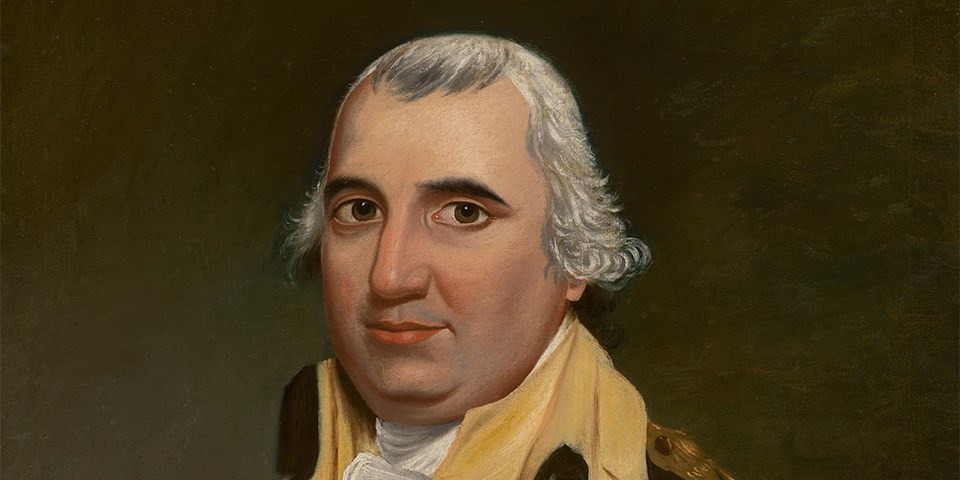Part of a series of articles titled The Constitutional Convention: A Day by Day Account for July 1 to 15, 1787.
Article
July 12, 1787: Progress Toward Compromise

National Portrait Gallery, Smithsonian Institution
"Property in slaves should not be exposed to danger, under a government instituted for the protection of property."
--Charles Cotesworth Pinckney (SC)
Thursday, July 12, 1787: The Convention Today
The delegates continued their discussion of the method for determining representation in the legislature, gradually moving toward a spirit of compromise. The three topics from the previous day continued to be the source of debate:
Butler (SC) agreed with G. Morris and repeated his arguments from previous days that Black Americans should be counted equally with White Americans (This would increase the political power of southern states with large enslaved populations). Davie (NC) stated that the southern states would refuse to adopt the Constitution if enslaved people were counted on a less than three-fifths basis.
Johnson (CT) thought that population approximated wealth and was the only thing that should be counted by the census. He also though that Black and White Americans should be counted equally.
G. Morris admitted that the southern states wouldn't adopt the Constitution if enslaved people didn't count at all for representation, but simultaneously Pennsylvania and other northern states wouldn't adopt the Constitution if enslaved people were counted. The only solution he saw was for the census to count both wealth and population, and for the enslaved to be counted as property instead of as people.
Charles Cotesworth Pinckney (SC) responded that this would only work if there was a rule for how to count wealth and if the Constitution protected the institution of slavery.
King (MA) didn't want to require Congress to reapportion representation, saying that such a requirement was unnecessary because if a northern dominated Congress in the future refused to give the South the representation owed to it, the South would threaten to use force to either leave the union or to demand more representation.
Ultimately, a motion was proposed with the following components:
The delegates continued their discussion of the method for determining representation in the legislature, gradually moving toward a spirit of compromise. The three topics from the previous day continued to be the source of debate:
- Whether Congress should be required to conduct a periodic census and readjust representation in the first house of Congress accordingly.
- Whether to count enslaved people in the census equally with free people, or to count them at three-fifths ratio.
- Whether the census, and congressional representation, should account for both wealth and population, or only population.
Butler (SC) agreed with G. Morris and repeated his arguments from previous days that Black Americans should be counted equally with White Americans (This would increase the political power of southern states with large enslaved populations). Davie (NC) stated that the southern states would refuse to adopt the Constitution if enslaved people were counted on a less than three-fifths basis.
Johnson (CT) thought that population approximated wealth and was the only thing that should be counted by the census. He also though that Black and White Americans should be counted equally.
G. Morris admitted that the southern states wouldn't adopt the Constitution if enslaved people didn't count at all for representation, but simultaneously Pennsylvania and other northern states wouldn't adopt the Constitution if enslaved people were counted. The only solution he saw was for the census to count both wealth and population, and for the enslaved to be counted as property instead of as people.
Charles Cotesworth Pinckney (SC) responded that this would only work if there was a rule for how to count wealth and if the Constitution protected the institution of slavery.
King (MA) didn't want to require Congress to reapportion representation, saying that such a requirement was unnecessary because if a northern dominated Congress in the future refused to give the South the representation owed to it, the South would threaten to use force to either leave the union or to demand more representation.
Ultimately, a motion was proposed with the following components:
- Enslaved Africans counted at a three-fifths ratio
- Direct taxation proportionate to representation
- A mandatory census every ten years
Synopsis
- The previous day's arguments resumed over whether and how a census should be conducted.
- Delegates came closer to a resolution on this complex question, ultimately deciding that the census would be every ten years and that enslaved people would be counted at a three-fifths ratio.
Delegates Today
- George Washington (VA) dined at Robert Morris's (PA) house and drank tea with Anne Livingston.
- Randolph (VA) wrote to the lieutenant governor of Virginia requesting further living expenses for the Virginia delegation.
Philadelphia Today
- The weather was hot and cloudy.
Last updated: September 1, 2023
